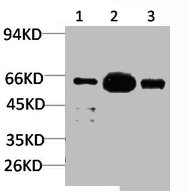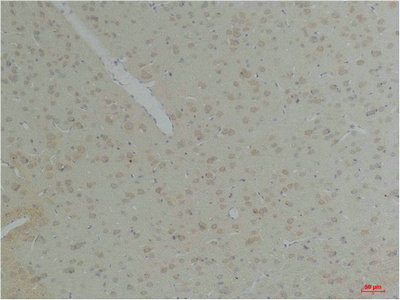KCNK10 Antibody
-
货号:CSB-PA345388
-
规格:¥880
-
图片:
-
其他:
产品详情
-
Uniprot No.:P57789
-
基因名:KCNK10
-
别名:KCNK10; TREK2; Potassium channel subfamily K member 10; Outward rectifying potassium channel protein TREK-2; TREK-2 K(+ channel subunit
-
宿主:Rabbit
-
反应种属:Human,Mouse,Rat
-
免疫原:Synthetic Peptide
-
免疫原种属:Homo sapiens (Human)
-
标记方式:Non-conjugated
-
纯化方式:The antibody was affinity-purified from rabbit antiserum by affinity-chromatography using specific immunogen.
-
浓度:It differs from different batches. Please contact us to confirm it.
-
保存缓冲液:Liquid in PBS containing 50% glycerol, 0.5% BSA and 0.02% sodium azide.
-
产品提供形式:Liquid
-
应用范围:WB, IHC, ELISA
-
推荐稀释比:
Application Recommended Dilution WB 1:1000-2000 IHC 1:100-200 -
Protocols:
-
储存条件:Upon receipt, store at -20°C or -80°C. Avoid repeated freeze.
-
货期:Basically, we can dispatch the products out in 1-3 working days after receiving your orders. Delivery time maybe differs from different purchasing way or location, please kindly consult your local distributors for specific delivery time.
相关产品
靶点详情
-
功能:Outward rectifying potassium channel. Produces rapidly activating and non-inactivating outward rectifier K(+) currents. Activated by arachidonic acid and other naturally occurring unsaturated free fatty acids.
-
基因功能参考文献:
- The M2-glycine hinge controls the macroscopic currents of TREK1 channels. PMID: 28676394
- This study showed that KCNK10 gene involved in neuronal growth and cerebellum development and associated with neurological and psychological disorders. PMID: 26381449
- The selectivity filter conformations of alternative translation initiation isoforms and wild type human TREK-2 are similar in the S4 site and pHo position. PMID: 26271386
- Results suggest that the cytosolic C-terminal domain and the bottom of transmembrane segment M2 are required for the 2-aminoethoxydiphenyl borate activation on TREK-2 channels PMID: 25982558
- How ion channels sense mechanical force: insights from mechanosensitive K2P channels TRAAK, TREK1, and TREK2. PMID: 26332952
- Modulation of K2P 2.1 and K2P 10.1 K(+) channel sensitivity to carvedilol by alternative mRNA translation initiation PMID: 25168769
- PLD2, but not PLD1, directly binds to the C terminus of TREK1 and TREK2. PMID: 25197053
- crystal structures of TREK-2 channel in 2 conformations and in complex with norfluoxetine, a state-dependent blocker of TREK channels; results provide an explanation for TREK channel mechanosensitivity, regulation by diverse stimuli and possible off-target effects of Prozac PMID: 25766236
- High TREK-2 expression is associated with epithelial ovarian cancer. PMID: 23479219
- Tissue-specific mRNA splicing regulates alternative translation initiation (ATI) of human K(2P)10.1 K+ background channels via recombination of 5 nucleotide motifs. PMID: 21669980
- Expression pattern and functional characteristics of two novel splice variants of the two-pore-domain potassium channel TREK-2. PMID: 11897838
- Predicts the role of TREK-2 in brain ischemia, memory and other tissues.[REVIEW] PMID: 17689202
显示更多
收起更多
-
亚细胞定位:Membrane; Multi-pass membrane protein.
-
蛋白家族:Two pore domain potassium channel (TC 1.A.1.8) family
-
组织特异性:Abundantly expressed in pancreas and kidney and to a lower level in brain, testis, colon, and small intestine. Isoform b is strongly expressed in kidney (primarily in the proximal tubule) and pancreas, whereas isoform c is abundantly expressed in brain.
-
数据库链接:
HGNC: 6273
OMIM: 605873
KEGG: hsa:54207
STRING: 9606.ENSP00000310568
UniGene: Hs.560255
Most popular with customers
-
-
Phospho-YAP1 (S127) Recombinant Monoclonal Antibody
Applications: ELISA, WB, IHC
Species Reactivity: Human
-
-
-
-
-
-






















